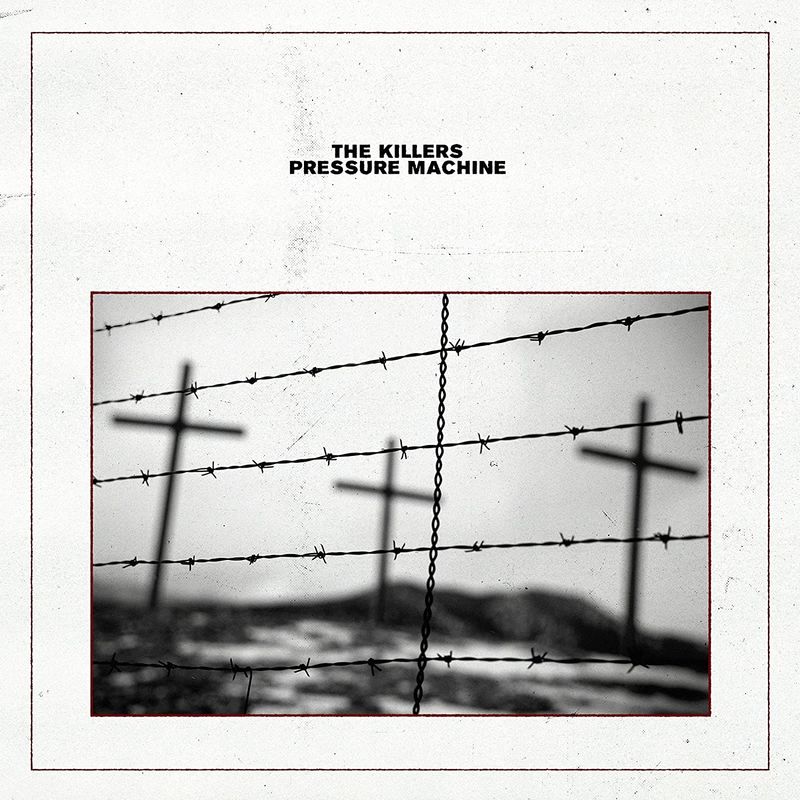
“This whole town is tied to the torso of God’s mysterious ways.”
Brandon Flowers has long used his small town upbringing as a source of inspiration, sketching his birthplace as a suffocating cultural backwater that he gladly left behind through a combination of natural talent, elbow grease, and good luck. If you need a reminder, just listen through Sam’s Town, which begins with the line, “Nobody ever had a dream ‘round here.”
On Pressure Machine, The Killers’ seventh studio album, Flowers reverses course by imagining an alternate history in which he didn’t become a rockstar—in which he stayed home in Nephi, Utah, married his high school sweetheart, raised his family in lower-middle class obscurity—in which he didn’t escape.
It’s a concept album of sorts, a collection of story-songs fueled by childhood memories, snippets of small town gossip, local newspaper headlines, and a vague sense of guilt. But while Flowers’ nostalgia-tinged lyrics evidence a newfound affection for the rustic hamlet he used to call home—it’s been upgraded from a “two star town” to a “cobweb town where culture is king”—he doesn’t idealize his memories. Instead, he takes the bad with the good and allows his confused emotions to coalesce into a messy portrait of a distinctly American community. God-fearing people who are quick to forgive, never lock their doors, and are always willing to lend a hand (‘Quiet Town’) are set against the opioid epidemic (‘West Hills’), rodeo accidents (‘Terrible Thing’), arson (‘Cody’), and extramarital affairs (‘Desperate Things’). Sweet memories of wildflowers and creek beds butt up against dead-end employment at the rubber plant—the only reliable gig in the economically distressed town.
They’ve got their treasure laying way up high,
Where there might be many mansions.
But when I look up, all I see is sky.
Flowers draws inspiration from historical events as well as the current residents of Nephi, several of whom are featured in spoken word vignettes interspersed among the album’s eleven tracks, presumably from non-staged interviews. These lo-fi recordings serve to flesh out the town’s geography, give a sense of its rural flavor, and accentuate the common hardships of its denizens. One of them has lived there for her entire twenty-six years and has rarely traveled outside of its confines; another waxes philosophical about a nearby railroad that serves as a way out for those that need it; still another considers whether or not he believes in “higher powers” that haunt the hillsides.
The people of Nephi are, like the natives of most communities, a mixed bag. Some suffer from backcountry ennui, others appear basically content with their lot in life. Others, like Flowers, strive to break out and make something of themselves someplace else. Songs like ‘Runaway Horses’ and ‘Pressure Machine’ posit Nephi as a kind of crucible that might indeed produce people of great virtue. On the other side of the same coin is the reality that the fire that purifies some will consume others. Flowers’ lyrics here calls to mind the uber-specific storytelling of John Darnielle (The Mountain Goats) and Mark Kozelek (Sun Kil Moon), even if his penchant for singalong choruses and cornball pastiche tends to take precedence over his character-driven narratives from time to time.
We had spring in our heels;
Unwavering forces.
Headfirst into the unknown.
The other touchstone is all too obvious, informing both the music and lyrics of Pressure Machine. Since their inception, the Killers have toiled away in the shadow of Springsteen, whose brand of heartland rock served as a template for the band’s new wave Americana. Pressure Machine is the Killers’ Nebraska, a sonically-restrained effort that is distinguished by its sobriety and relative lack of polish. It’s much more sophisticated than the acoustic demo aesthetic of Springsteen’s album, and never quite as somber, but its areas of density feel organic and complementary, with the synths making room for bountiful steel string, harmonica, fiddle, mandolin, and cello. Maybe some DNA from The River is also spliced in there. Guitarist Dave Kuenig returns after a brief sabbatical to ensure that the album is more than a gussied up Flowers solo record.
Jiminy Cricket and Power Wheels,
And memories of Happy Meals.
Previous Killers albums were dominated by songs written to be sung to large crowds; Pressure Machine feels considerably more intimate, as if Flowers wrote the entire album with only God as his audience. And I say that without an ounce of hyperbole. It’s as close to front-and-center as Flowers’ personal faith has been on record, with numerous overt references mixed into the lyrics but an overriding sense that the whole album is one long confessional prayer, complete with a few clumsy lines delivered in earnest.
There’s no ‘Mr. Brightside’ or ‘When You Were Young’ or ‘Human’ on Pressure Machine—in fact, there are no singles at all—but there doesn’t need to be. Beyond the glitzy excess that granted them access to world tours and massive sales, we now glimpse a more introspective side to the band that proves acutely compelling.
Favorite Tracks: West Hills; Quiet Town; In the Car Outside; Desperate Things.